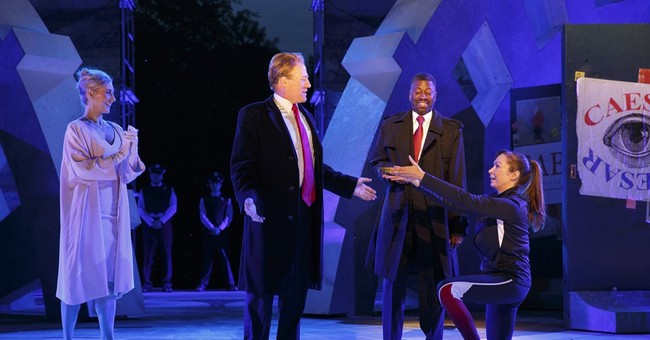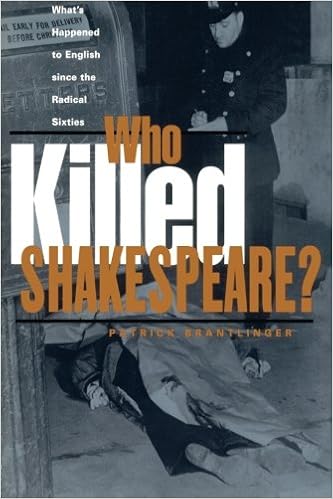
Posted on 06/23/2017 7:00:37 AM PDT by Kaslin

Julius Caesar is dead (again). Long live "Julius Caesar."
Whether the famous dead Roman is a lookalike for President Donald Trump, with a blond comb-over and a long red tie; a cool black dude in a tailored suit suggesting former President Barack Obama; or a 1930s Orson Welles with a Sam Browne belt resembling Benito Mussolini, the character has captured the imagination of the public and the players since Shakespeare wrote the play more than four centuries ago.
The spectacle changes with fresh costumes and new sets to emphasize contemporary issues for specific audiences, but the words continue to plumb psychological depth and measure human insight no matter where and when they're said, or who says them.
More's the pity that the furor over the fleeting production of "Julius Caesar" in New York's Central Park draws most of the public attention to current politics and misses an opportunity to expand appreciation for the Bard of Avon's language and brilliant character studies, enlivened by many points of view.
To rephrase and expand the words of Hamlet, "the play's the thing." The words can prick the conscience of a king or a subject, a president or a voter, and even a director and an audience. They can activate emotions, broaden the power of the brain and deepen understanding, but it's important not to allow them to narrow the focus to contemporary animosities. That only reinforces prejudice and doesn't sharpen insight.
With a media -- social and otherwise -- obsessed with polarizing hatreds, we miss another opportunity to stretch the mind.
In all the bitter protests and defenses of the summer's production of "Julius Caesar" in the park, it's a good bet that few of the frenzied opinionators have ever actually read or watched the whole play. It was once a staple of high school English classes, but a limited informal survey suggests that few graduate from high school, or even college, having read it. A formal survey supports my speculation that teaching Shakespeare is in dramatic decline.
The American Council of Trustees and Alumni, or ACTA, a nonprofit academic watchdog for traditional educational standards, found two years ago that only four of the nation's 52 highest-ranked universities and colleges have a Shakespeare requirement, and only 8 percent of the top universities require English majors to take a course in Shakespeare. Since many of these English majors become English teachers, it's not likely they will teach what they haven't studied. They probably wouldn't recognize the title of the ACTA report, as taken from "Julius Caesar" -- "The Unkindest Cut: Shakespeare in Exile in 2015."
Literary criticism suffers on the contemporary campus because there's so much emphasis on race, class, gender and sexuality. Requirements are reduced for the study of Shakespeare's plays, and they're expanding for "non-canonical traditions," giving equal weight to other forms of expression.
After the ACTA report encouraged a serious discussion on the need to brush up on Shakespeare, a teacher at an inner-city high school in Sacramento, California, wrote in the Washington Post that she does not think she is "cheating" her students by not teaching Shakespeare. "I do not believe that a long-dead, British guy is the only writer who can teach my students about the human condition," wrote Dana Dusbiber, capturing multi-culti zeal. "So I ask, why not teach the oral tradition out of Africa, which includes an equally relevant commentary on human behavior?" This could be taken as satire if she were not so earnest in her literary equivalency argument, but it's a sad example of the thinking that infects education across a broad spectrum of both thinking and geography.
One reason "Julius Caesar" became a staple for students in high school was that the language is straightforward, more rhetorical than poetic, illustrating the power of simplicity with dozens of well-chosen monosyllabic words, as in, "Lend me your ears." At the same time, the drama engages a variety of complex points of view, offering substantial red meat for teenagers to debate social and psychological motives, and to see how difficult it is to untangle principle from passion, personal emotion from political motive, naive action from harmful consequence.
The simplistic rhetoric of the conspirators bathing their hands in the blood of dead Caesar and crying, "Peace, freedom and liberty!" is not so glibly experienced when Mark Antony shakes those bloody hands and the symbolism runs onto his flesh.
When social media polarized the summer's production of "Julius Caesar," another Shakespearean insight was lost, an insight that might apply to those who argue from their own narrow convictions, not from the play, that "The fault, dear Brutus, is not in our stars,/ But in ourselves."

I wonder if the audiences ever listened to the dialouge. Maybe they would have discovered that Caesar is NOT the villain of the piece and his death was at the hands of the elites, the Senate, whose power and wealth his reforms threatened. Cassius rallies them, notably the patriotic Brutus, not by recounting Caesar’s crimes, for there are few or none of note, but by the fear of what he might do. Indeed the Senate are the Trump Haters. Impeachment their assassination.(At least I hope that is as far as they will go). But is civil war and an end to our Republic where they really want to go? They should really read the play.
This Shakespeare in the Park production really annoys me, because they basically pissed on the play in order to get their Trump assassination fantasies onstage. I bet they thought they were clever as hell in staging Trump's death in the guise of a Shakespeare play.
On a side note, in that photo, the woman standing behind Caesar/Trump looks like Ivanka. Did they portray Caesar's wife Calpurnia as Ivanka? If so, then the production was even more disgusting than I originally thought.
Brutus is the hero of the play, Antony is the villain (or rather, antagonist). Caesar is neither, but his death is the catalyst for the play. If the play were actually about Caesar, he would not have expired in the middle of the play. You're right that Shakespeare does not portray Shakespeare as an out right villain. Much of the bad stuff we hear about him from Cassius seems to be based on envy rather than fact. When Caesar decides to go to meet with the Senate in spite of his wife's warnings, he says
“Cowards die many times before their deaths;
The valiant never taste of death but once.
Of all the wonders that I yet have heard,
It seems to me most strange that men should fear;
Seeing that death, a necessary end,
Will come when it will come.”
Pretty heroic stuff, in ringing iambic pentameter.
I have read every play Shakespeare wrote and seen many of them live. Julius Caesar is one of my favorites. I’m disgusted at the way the Ctrl-Left twists this great work to reverse its meaning, although it’s remarkably similar to the way they twist the Constitution to mean the opposite of what the words say.
Should have read "does not portray Caesar"
They really should read the play. And maybe with the law of unintended consequences at work some impressionable liberal mind will read it and start to understand. It may be unlikely given the indoctrination that passes for education in most places today. But I can hope. The humanity and political intrigue of the play is as relevant today as it was in Shakespeare’s and Caesar’s time. “Brutus is an honorable man” actually meaning the opposite still holds up for our modern Senate as it did for the Roman. Substitute the modern Senator or Congressman of your choice for Brutus.
So this Shakespeare guy was a historian? What he wrote here is what ACTUALLY happened? I’m guessing he was closer to a Journalist of today...he wrote what sounded good to him. Facts be damned! Et Tu Bluto?
Oh, Shakespeare was a propagandist of the first order. Read and compare “Macbeth” with the real history if you want some proof of that.
Disclaimer: Opinions posted on Free Republic are those of the individual posters and do not necessarily represent the opinion of Free Republic or its management. All materials posted herein are protected by copyright law and the exemption for fair use of copyrighted works.